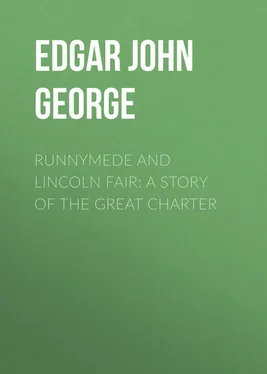John Edgar - Runnymede and Lincoln Fair - A Story of the Great Charter
Здесь есть возможность читать онлайн «John Edgar - Runnymede and Lincoln Fair - A Story of the Great Charter» — ознакомительный отрывок электронной книги совершенно бесплатно, а после прочтения отрывка купить полную версию. В некоторых случаях можно слушать аудио, скачать через торрент в формате fb2 и присутствует краткое содержание. Жанр: foreign_antique, foreign_prose, на английском языке. Описание произведения, (предисловие) а так же отзывы посетителей доступны на портале библиотеки ЛибКат.
- Название:Runnymede and Lincoln Fair: A Story of the Great Charter
- Автор:
- Жанр:
- Год:неизвестен
- ISBN:нет данных
- Рейтинг книги:3 / 5. Голосов: 1
-
Избранное:Добавить в избранное
- Отзывы:
-
Ваша оценка:
- 60
- 1
- 2
- 3
- 4
- 5
Runnymede and Lincoln Fair: A Story of the Great Charter: краткое содержание, описание и аннотация
Предлагаем к чтению аннотацию, описание, краткое содержание или предисловие (зависит от того, что написал сам автор книги «Runnymede and Lincoln Fair: A Story of the Great Charter»). Если вы не нашли необходимую информацию о книге — напишите в комментариях, мы постараемся отыскать её.
Runnymede and Lincoln Fair: A Story of the Great Charter — читать онлайн ознакомительный отрывок
Ниже представлен текст книги, разбитый по страницам. Система сохранения места последней прочитанной страницы, позволяет с удобством читать онлайн бесплатно книгу «Runnymede and Lincoln Fair: A Story of the Great Charter», без необходимости каждый раз заново искать на чём Вы остановились. Поставьте закладку, и сможете в любой момент перейти на страницу, на которой закончили чтение.
Интервал:
Закладка:
As Hugh de Moreville and Oliver Icingla, guided by a gentleman attached to the royal household, walked up the hall and approached the elevation of the daïs, this personage, whose array was so magnificent, and whose air was so imperious, turned round and directed, first at one and then at the other, a glance which indicated so clearly that his sentiments towards them were the very reverse of favourable, that Oliver halted in alarm, and for a moment or two stood staring wildly before him with his hand on the hilt of his sword. Before him, and regarding him with a scowl which would have made even nobler and more refined features unpleasant to look upon, and with an eye that glared on him as the tiger glares when about to spring on its victim, was the prince for the sake of whose crown he had scorned the friendship of Fitzarnulph and defied the enmity of De Moreville. It was the man to whose tender mercies he was now to be intrusted. It was King John.
CHAPTER VI
KING JOHN
ON the 27th of May, 1199, the Abbey of Westminster was the scene of an impressive ceremony. On that day, and in that edifice, a man of thirty-two years of age was solemnly crowned King of England, and took the oaths to govern justly. He had seen much of life, enjoyed considerable experience in affairs of state, and was not deficient in intellectual culture. Moreover, he had the advantage of a healthy and vigorous frame, and of a countenance sufficiently well formed to be thought handsome. But on his face there appeared an expression, now of dissolute audacity, now of sullen temper, which might have made an intelligent spectator presage that, ere long, the cry of “Long live the king!” would give way to the stern shout of “Death to the tyrant!”
The personage who had the distinction of being on that memorable occasion “the observed of all observers” was John of Anjou, the youngest of the five sons who sprang from the marriage of the second Henry and Eleanor of Guienne. Of the five sons, four had gone the way of all flesh. William died in childhood; Henry died of fever while in rebellion against his father; Geoffrey was trampled to death while taking part in a tournament at Paris; Richard expired of a mortal wound inflicted by the arrow of Bertrand de Gordon, while he was besieging the castle of Chalus; and John, as the survivor, claimed not only the kingdom of England, but that vast Continental empire which the first of our Plantagenet kings had extended from the Channel to the Pyrenees.
Matters, however, did not go quite smoothly; nor was John without a rival. Some months after his elder brother, Geoffrey, was killed in the tournament at Paris, Geoffrey’s widow, Constance of Brittany, gave birth to a son, to whom the Bretons, in honour of the memory of their mythical hero, gave the name of Arthur. King Richard was well inclined towards his nephew, and anxious to educate the boy to succeed him. But Constance, a weak and somewhat vicious woman, refused to place her son in the custody of Cœur de Lion, who, in consequence, recognised John as his heir. Nevertheless, on Richard’s death, the people of Anjou and Brittany proclaimed young Arthur as their sovereign; and Constance, carrying him to the court of Paris, placed him under the protection of Philip Augustus. But Philip, after making great professions, and promising to give Arthur one of his daughters in marriage, concluded a treaty with John in 1200, and, without scruple, sacrificed all the boy’s interests.
And now John’s throne seemed secure; and both the crown of England and the coronal of golden roses – the diadem of Normandy – sat easily on his brow; but at this juncture his indiscretion hurried him into a matrimonial project which cost him dear.
It was the summer of 1200, and John made a progress through Guienne to receive the homage of that province. In Angoulême, at a great festival given in his honour, his eye was attracted and his imagination captivated by Isabel, daughter of the count of that beautiful district – a lovely nymph not more than sixteen. John became passionately enamoured; and as “maidens, like moths, are caught by glare,” Isabel to be “a crowned queen” was “nothing coy.” It is true that there were serious obstacles in the way of a matrimonial union. John had previously been married to a daughter of the Earl of Gloucester, and Isabel affianced to Count Hugh de la Marche. But the obstacles were not deemed insuperable; for the Church had forbidden John to take home his bride, on account of their nearness of kin; and he, as sovereign of Angoulême, had power to break the link which bound the fair heiress to the man to whom she had been betrothed. Moreover, the parents of the young lady encouraged John’s passion; and, all difficulties having been got over for the time being, John and Isabel were united at Bordeaux, and sailed for England. On their arrival a grand council was held at Westminster; and Isabel of Angoulême, having been acknowledged as queen, was formally crowned by the Archbishop of Canterbury.
So far all went smoothly. But, ere a year elapsed, the royal pair were alarmed with rumours of a formidable confederacy. Hugh de la Marche, who had, not without indignation, learned that his affianced bride was handed over to another, first challenged John to mortal combat, and, on the challenge being declined, took up arms to avenge the wrong he had sustained. Accompanied by his tender spouse, John repaired to the Continent to defend his dominions, and visited the court of Paris. Philip Augustus received and entertained the King and Queen of England with royal magnificence, and professed the strongest friendship. But no sooner had they turned their backs than Philip, who was a master of kingcraft, resolved on John’s ruin, and allied himself closely with John’s foes.
It would seem that the darling object of Philip Augustus was to make France the great monarchy of Europe; and he was bent, therefore, on humbling the pride and appropriating the Continental territory of the Plantagenets. In the days of Henry and of Richard, Philip’s efforts had been almost barren of results. But against an adversary like John he had little doubt of achieving substantial successes, and of being able to seize the territory which had gone from the kings of France with Eleanor of Guienne. While John, under the impression that Philip was his stanch friend, was parading, with indiscreet bravado, before the eyes of his Continental subjects, Philip recalled Arthur of Brittany, now fifteen years of age, to the French court, and again espoused his cause.
“You know your rights,” said Philip, “and you would like to be a king?”
“Assuredly I would,” answered the boy.
“Well,” said Philip, “I place two hundred knights under your command. Lead them into the provinces which are your birthright, and I will aid you by invading Normandy.”
At the head of a little army Arthur raised his banner, and, marching into Guienne, boldly attacked Mirabeau, where his grandmother, Queen Eleanor, was then residing, and succeeded in taking the town. But Eleanor, retreating to the citadel, defied the besiegers, and sent to inform John of her peril.
At that time John was in Normandy, and, without loss of a day, he marched to his mother’s rescue, entered Mirabeau in the night, totally routed his enemies, and, having taken Arthur prisoner, conveyed him to Falaise. From Falaise he was removed to Rouen, and soon after the body of a youth was seen by some fishermen of the Seine, ever and anon rising, as it seemed, out of the water, as if supplicating Christian burial. On being brought ashore the body was recognised to be that of Arthur of Brittany, and it was secretly interred in the Abbey of Bec.
Whether Arthur had been killed by King John and flung into the Seine, or whether he had fallen into the river and been drowned while attempting to escape from the castle of Rouen, remains an historic mystery. But neither the Bretons nor Philip Augustus expressed any doubt on the subject. Within a week after the tragical event the Bretons demanded justice on the head of the murderer; and Philip summoned John, as one of his vassals, to appear before the Twelve Peers of France, and answer to the charge. Without denying the jurisdiction of the court, John declined to appear unless granted a safe conduct; and, the Twelve Peers having pronounced sentence of death and confiscation, Philip took up arms to execute the sentence, and seized cities and castles in such numbers, that, ere long, John retained little or nothing of the Continental empire of the Plantagenets, save Bordeaux, and a nominal authority in Guienne. One effort he did make to redeem his fortunes. But, losing heart and hope, he abandoned the struggle, and, returning to England, entered on that contest with the Church which was destined to involve him in ruin.
Читать дальшеИнтервал:
Закладка:
Похожие книги на «Runnymede and Lincoln Fair: A Story of the Great Charter»
Представляем Вашему вниманию похожие книги на «Runnymede and Lincoln Fair: A Story of the Great Charter» списком для выбора. Мы отобрали схожую по названию и смыслу литературу в надежде предоставить читателям больше вариантов отыскать новые, интересные, ещё непрочитанные произведения.
Обсуждение, отзывы о книге «Runnymede and Lincoln Fair: A Story of the Great Charter» и просто собственные мнения читателей. Оставьте ваши комментарии, напишите, что Вы думаете о произведении, его смысле или главных героях. Укажите что конкретно понравилось, а что нет, и почему Вы так считаете.












